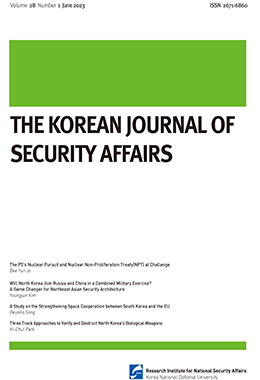Under North Korea’s nuclear and missile development, trilateral security and military cooperation between the Republic of Korea, the U.S., and Japan seems unavoidable but only security option against North Korea’s threats. Threat assessments has much focused on existing threats like North Korean nuclear and missiles as well as new technology threats like Artificial Intelligence, Cyber, Drone and Cyber warfare capabilities; but rarely focus on North Korean military cooperation with China and Russia. Interestingly, since the end of the Korean War and a withdrawal of the Chinese Volunteer Forces (CVFs) in the late 1950’s, there has been no single combined military exercises between the Korean People’s Army (KPA), People’s Liberation Army (PLA) and the Russian Army over the seven decades. In 2018, VOSTOK exercise was the first combined exercise between the Russian Army and the PLA in history and it strongly led a strong reaction of the Western communities. Now it is naturally a time for North Korea to join Russia and Chinese military exercise against trilateral security partnership in other side, but there has been no research on this possible scenario and has only focused an independent North Korean threat. A possibility of the KPA to join a combined military exercise between the PLA and the Russian Army is under researched but a game changer for Northeast Asian Security Architecture rather than many nuclear and missile tests of North Korea. This paper examines why North Korea never had a combined military exercise with the PLA or the Russian Army in the past, why now this could be possible scenario and how the ROK-US alliance should prepare for this possible nightmare scenario. This research hopes to educate policy makers about this under-researched topic and render policy implications for further development of trilateral security partnership near future.




